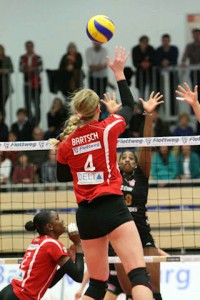With a population over 25,000, it stands to reason that some former Collinsville residents will find their way to various corners of the world.

Former CHS volleyball player Michelle Bartsch, who currently plays professionally in Germany / Submitted photo
Michelle Bartsch has taken an unlikely path, though. A multi-sport star at Collinsville High School, she graduated in 2008 and went from being a Kahok to playing professional volleyball in Germany.
Kyle Escontrias, who coached Bartsch in high school and on a club team, isn’t surprised that she’s made it to where she is today.
“I knew she was dead set on making volleyball a huge part of her life,” Escontrias said. “She put in the time and the effort and the work to make that happen.”
Her work effort is part of the reason Escontrias said she was the best player on either side of the net when she played for the Kahoks and her club team.
“She was a kid that was never satisfied with how good she was. She was always so willing and so eager to get better,” Escontrias said. “It’s probably the biggest reason she’s the player she is now.”
Escontrias said Bartsch’s experience playing in the USA volleyball pipeline has carried through to her being able to play internationally. This past season, she played for a team called the Rote Raben in the small German town of Vilsbiburg (population about 12,000).
“We’re about 45 minutes from Munich in a little, itty bitty farm town,” Bartsch said.
Just recently, she has signed a contract to play for another team, Dresden DSC, in Dresden, Germany. Her new German home has a population of more than 530,000.
Traveling and being in foreign countries isn’t a new concept to Bartsch, who said she has family in Austria and her grandparents are from Germany.
“We would travel to Europe as a family, more when I was younger,” Bartsch said. “Growing up, I traveled a lot with sports and traveled all over the country.”
Before playing professionally, she played volleyball for the Kahoks and the University of Illinois, where she left her mark on the record books. She ended her career with 1,644 kills and 1,035 digs, good for seventh and 10th, respectively, all-time at Illinois.
As a member of the Fighting Illini, she also earned first-team All-American honors from Volleyball Magazine, as well as being named a three-time All-American by the American Volleyball Coaches Association.
U of I finished second in the Big Ten four straight times while Bartsch attended the university and made four straight appearances in the NCAA Sweet 16. In 2011, she helped the Illini beat No. 1 USC in the NCAA National Semifinal. Illinois lost to UCLA in the championship.
That same year, she was named to the All-NCAA Tournament Team after finishing with 44 kills and 36 digs in the final two matches of the tournament.
After her career at U of I, she played one professional season in Puerto Rico, but even with that experience, she said Germany is completely different than anything she’s seen before.
“Every team has different styles. Some are really fast. Some are good at defense. Some are bad at defense,” Bartsch said. “It’s always sort of a challenge because every team is new. [The competition is] comparable to a lower level Division I team.”
The language has also been a challenge for Bartsch, who has to take German lessons as part of her contract.
“I can understand a lot more than I can actually speak,” Bartsch said. “For me, it’s really hard to make some of the sounds German makes.”
Her journey to Germany from Collinsville included the stop in Puerto Rico and a stay in California.
At CHS, Bartsch played several sports, including swimming, track, basketball and, of course, volleyball.
“Growing up, I always played sports every single season,” Bartsch said. “Focusing on one, it was kind of a nice change, but I did miss playing some of the other sports.”
After graduation, though, she had to choose between basketball and volleyball, and once she made her choice, she committed to Illinois.
Bartsch said the women she played with and the coaches she played for at Illinois were great, but attending classes in addition to playing volleyball was more than a full-time job.
“We played August through December,” Bartsch said. “Right when you came back to school in January, we started practice again. There’s not much of a break.”
The demanding schedule was just a preview of what her life would be like when she would eventually play professionally.
Bartsch’s first professional experience came after the fall 2011 season at U of I, when she moved to Puerto Rico, where she played from January to May, but left unsure of her future.
“It wasn’t the best experience, so I didn’t know if I wanted to keep pursuing being a professional,” Bartsch said.
She moved back to the States and soon had a chance to become one of the coaches for the men’s volleyball team at the University of California, Irvine. The Anteaters won the national title in 2012.
“We actually won the national championship again [in 2013],” Bartsch said. “It was a completely different atmosphere. I really liked it.”
Bartsch said she was originally set on staying at UC Irvine as an assistant coach, but decided to continue playing volleyball.
In August, a week before the Anteaters season started, Bartsch’s agent contacted her and told her a team in Vilsbiburg, Germany was interested in her.
Bartsch said she took a risk by going to Germany to try out for the team, called the Rote Raben, or Red Ravens in English.
“I flew out there and had a week tryout,” Bartsch said. “I never had anything in a contract until after a month of staying there.”
Both the Rote Raben and Dresden DSC play in the Bundesliga, which is the highest league in German volleyball. Both teams have had recent success, with the Rote Raben finishing second behind Dresden DSC in the league last year, as well as winning the German Cup. It was the best finish in Vilsbiburg history.
In Germany, Bartsch has another busy volleyball schedule. The season runs from August until April or May and is filled with not only Bundesliga matches but cup tournament matches and European league matches as well.
It can be lonely playing overseas, Bartsch said, but her husband lives with her and travels with her, which she said has helped a lot.
“You practice twice a day, and you don’t really want to do anything between those practices,” Bartsch said. “It was good to have someone to come home to.”
If she keeps playing in Germany, she won’t have much time to make it back to her home in the States.
“Usually, [I’m just home] for the summer months,” Bartsch said. “I’m back now for a couple weeks, but then I’m going back to U of I to train with the team.”
For Bartsch, her plan for the next five years and beyond is clear, though she has taken an unconventional route up to this point in her life.
“I want to play for a really long time. Right now, the plan is [to play] for at least five more years,” Bartsch said. “Then, have kids because at that time, I’ll be almost 30. We want kids.”
Speaking of kids, Escontrias said he would welcome coaching a team full of 10 kids like Bartsch.
“It’d be a lot of fun to be able to interact with kids that put as much passion into the game as she does,” Escontrias said. “She’s turned into a great person. She really has.”



